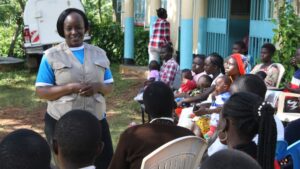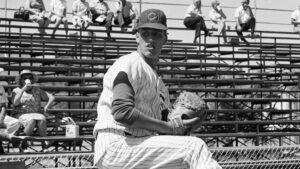Sally Grobani knows all about pikuach nefesh, the Jewish legal obligation to save a life in jeopardy. She’s a living example of that principle.
On Dec. 5, Grobani, a Hebrew and Judaics teacher at Pikesville’s Krieger Schechter Day School and the mother of two adult daughters, was wheeled into an operating room at Johns Hopkins Hospital. But she wasn’t ailing; Grobani was there to donate a kidney to Jay Pintzuk, the husband of a KSDS colleague who was suffering from end-stage kidney disease.
Hours later, Pintzuk was the recipient of a healthy kidney — and a brand new life.
“I am thrilled and delighted at how kind Sally is,” says Pintzuk, 68, a retired social worker for the Baltimore City Department of Social Services and the father of one adult son. “I was humbled that Sally, a person I didn’t even know, helped me.”
Grobani didn’t know Pintzuk personally, although they later discovered that her late father-in-law, Temple Oheb Shalom Cantor Benjamin Grobani, taught Pintzuk his bar mitzvah maftir. But she was acquainted with his wife, Brina, a longtime art teacher at KSDS.
“We didn’t socialize, we were just colleagues,” says Grobani, 56, who lives in Pikesville with her husband, Dr. Anton Grobani. “I’d hear [over the years] that Jay was ill, but I didn’t know how ill.”
Jay Pintzuk, who lives in Pikesville, first started having chronic kidney-related health issues in 2003. By early 2015, his doctors told him that he needed a kidney transplant. “It was devastating,” says Pintzuk. “My mother and sister died of [renal failure].”
Brina Pintzuk knew she had to find a kidney for her husband. In December of 2015, she sent an email to the KSDS faculty and staff explaining why she was absent from work, because of her husband’s renal disease and dialysis..“Right after that, Sally came up to me and said she would go in for testing [for a donation]. I couldn’t believe it,” recalls Brina Pintzuk.
In the past, Grobani says she thought about donating a kidney after reading a plea for one on Facebook. Now, she had a chance to make a difference, right in her own community.
Unqualified Support
According to the National Kidney Foundation, more than 100,000 people in the United States last year were waiting for kidney transplants. According to the foundation, 13 people die daily while waiting for a life-saving kidney transplant. Kidneys from live donors are preferred because they last longer and begin to function more quickly. Live donations also free up a cadaveric kidney for another recipient.
After consulting with her family — who were supportive after learning that her health would not be compromised by the donation – Grobani met and discussed donation with a transplant nurse at the Johns Hopkins Kidney Transplant Program, part of the Comprehensive Transplant Center at Hopkins. (The center’s surgical director, Dr. Benjamin Philosophe, is a KSDS parent and supporter.)
Even though Grobani’s kidney was deemed a match for Pintzuk, she still needed to undergo months of testing, both physical and psychological, to see if she was right for donation. One key question was if her employer would be supportive of her donation, because of the time commitment.
The answer was an unequivocal yes. Rabbi Moshe Schwartz, head of school at KSDS, gave Grobani his unqualified support, she says.
“We’re mishpachah [family],” Rabbi Schwartz says. “We’re teaching that we are a family and care about our people in ways that are personal and practical. … Sally is an incredible woman and an outstanding teacher.”
Grobani and Brina Pintzuk also received an outpouring of support from their other colleagues at KSDS, as well as from their congregations, Chizuk Amuno and Chevrei Tzedek. Congregants and colleagues devised a meal preparation and distribution schedule (and donated restaurant gift cards) to help support the Grobanis and Pintzuks after the surgeries.
“They have all gone out of their way,” says Brina Pintzuk, noting that former KSDS Head of School Dr. Paul D. Schneider came to the hospital on the day of surgery. “It’s been amazing. Everyone in this story went the extra mile.”
In addition, Grobani’s sister and brother-in-law who live in Israel sponsored a special kiddush program at their synagogue to honor and support Grobani and the Pintzuks before the operations. “I felt like I had all of the support and prayers for both of us,” says Grobani.
Without A Hitch
During the months of testing, Grobani and Brina Pintzuk say they purposely didn’t talk about the kidney matter. “I didn’t want to pry,” says Grobani.
For her part, Brina Pintzuk says she knew that Grobani always had the option to change her mind, as does any live donor. Still, the two women say they grew close in recent months.
In early October, Grobani finally got full approval for her kidney donation.
“We heard the transplant was a go [on] erev Yom Kippur,” says Brina Pintzuk. During the December surgeries — Grobani’s lasted three hours, Jay Pintzuk’s four — Brina Pintzuk kept updating her loved ones about her husband’s progress. Fortunately, both surgeries went off without a hitch.
“My first thought after waking up from the surgery was, ‘How’s Jay?’” says Grobani.
Three weeks later, both Grobani and Pintzuk are well on their way to making full recoveries. “Jay’s life has changed already,” says his wife. “He looks younger, has more energy and strength. This whole process has touched so many people in a big way.”
Says Rabbi Schwartz: “What’s most important is that both of them are healthy and well, and we are praying for their speedy recovery.”
The kidney donation has already sparked conversations at KSDS about the matter of organ donation. Both teachers hope that it will inspire more people to become donors.
Says Brina Pintzuk, who plans to talk to KSDS students in the future about how ideas can lead to solutions: “One little step can make such a difference.”
She says she continues to be in awe of Grobani’s compassion and sacrifice. “I said, ‘Sally, I would never ask someone to do this.’ She said she’s always wanted to do this,’” says Brina Pintzuk. “You could’ve knocked me over with a feather. Unbelievable.”
Grobani shrugs aside all accolades. “We are all going through our lives looking for an opportunity to help,” she says. “This opportunity just fell into my lap. If someone is in need and I am capable of helping them, I thought, why not?”
Jill Yesko is a Baltimore-based freelance writer.
Jmore Editor-in-Chief Alan Feiler contributed to this report.
Photo of (lower row) Brina and Jay Pintzuk and (upper row) Dr. Anton and Sally Grobani by Ed Bunyan





